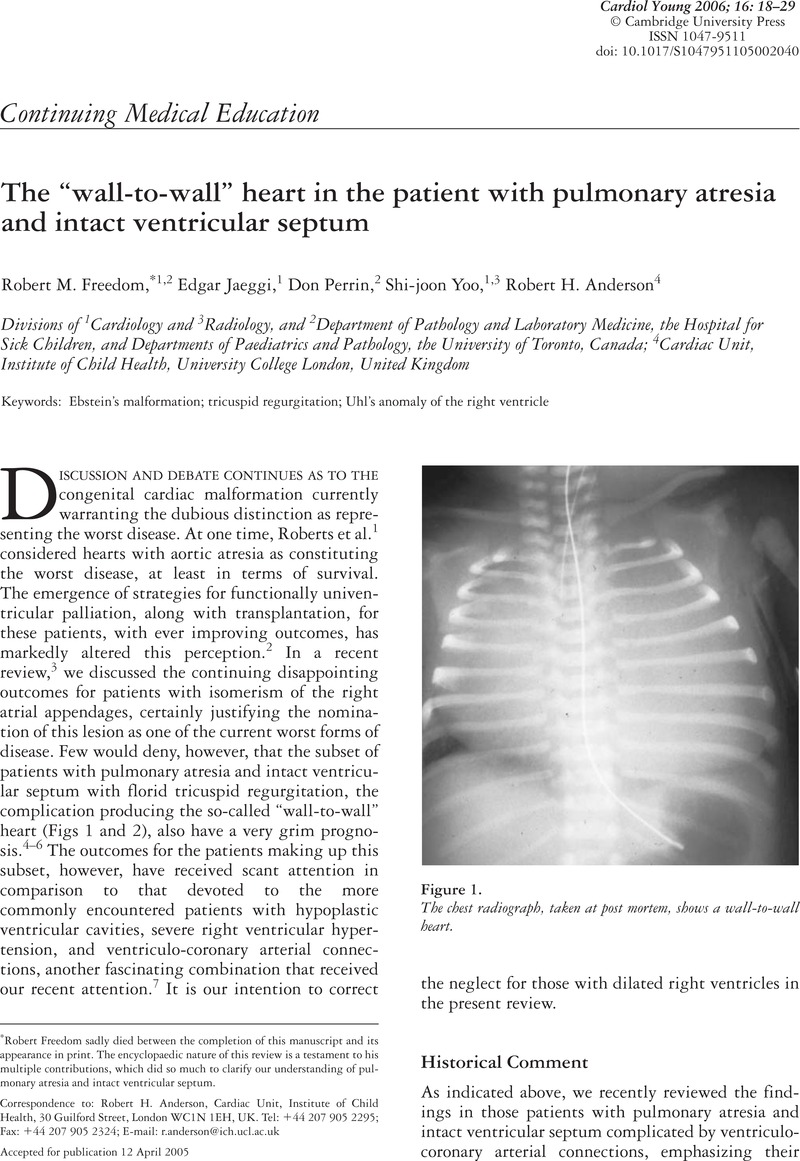Crossref Citations
This article has been cited by the following publications. This list is generated based on data provided by Crossref.
Anderson, Robert H.
2006.
Solving the disputes concerning the congenitally malformed heart.
Progress in Pediatric Cardiology,
Vol. 22,
Issue. 2,
p.
147.
Anderson, Robert H.
2006.
From the Editor-in-Chief.
Cardiology in the Young,
Vol. 16,
Issue. 1,
p.
2.
Snyder, Christopher S.
and
Moodie, Douglas S.
2006.
Review of Abstracts from the Association for European Paediatric Cardiology Meeting, May 24?27, Basel, Switzerland.
Congenital Heart Disease,
Vol. 1,
Issue. 5,
p.
254.
Carvalho, Julene S
2008.
Fetal Cardiology.
p.
269.
De Stefano, Danielle
Li, Peining
Xiang, Bixia
Hui, Pei
and
Zambrano, Eduardo
2008.
Pulmonary atresia with intact ventricular septum (PA‐IVS) in monozygotic twins.
American Journal of Medical Genetics Part A,
Vol. 146A,
Issue. 4,
p.
525.
Jaeggi, Edgar T.
and
Cavalle-Garido, Tiscar
2009.
Congenital Diseases in the Right Heart.
p.
293.
2009.
The Natural and Unnatural History of Congenital Heart Disease.
p.
494.
Daubeney, Piers E.F.
2010.
Paediatric Cardiology.
p.
647.
O’Leary, Patrick W.
Dearani, Joseph A.
and
Anderson, Robert H.
2010.
Paediatric Cardiology.
p.
713.
Anderson, Robert H.
and
Spicer, Diane
2010.
Fistulous communications with the coronary arteries in the setting of hypoplastic ventricles.
Cardiology in the Young,
Vol. 20,
Issue. S3,
p.
86.
Jaeggi, Edgar T.
and
Tulzer, Gerald
2010.
Paediatric Cardiology.
p.
199.
Naqvi, Nitha
and
Daubeney, Piers E.F.
2011.
Diagnosis and Management of Adult Congenital Heart Disease.
p.
339.
Tonni, Gabriele
Ventura, Alessandro
Pattacini, Pierpaolo
Bonasoni, MariaPaola
and
Ferrari, Bruno
2012.
Complex Cardiac Defect, Bowing of Lower Limbs and Multiple Anomalies in Trisomy 22. Ultrasound, Post-Mortem CT Findings with Necropsy Confirmation.
Fetal and Pediatric Pathology,
Vol. 31,
Issue. 6,
p.
439.
Perloff, Joseph K.
and
Marelli, Ariane J.
2012.
Clinical Recognition of Congenital Heart Disease.
p.
429.
Barre, E.
Durand, I.
Hazelzet, T.
and
David, N.
2012.
Ebstein’s Anomaly and Tricuspid Valve Dysplasia: Prognosis After Diagnosis In Utero.
Pediatric Cardiology,
Vol. 33,
Issue. 8,
p.
1391.
Chubb, Henry
and
Daubeney, Piers E. F.
2012.
Pediatric Cardiovascular Medicine.
p.
572.
Frescura, Carla
and
Thiene, Gaetano
2014.
The New Concept of Univentricular Heart.
Frontiers in Pediatrics,
Vol. 2,
Issue. ,
Austin, Erle H.
and
Kozik, Deborah J.
2016.
Sabiston and Spencer Surgery of the Chest.
p.
2113.
Kwiatkowski, David M.
Hanley, Frank L.
and
Krawczeski, Catherine D.
2016.
Right Ventricular Outflow Tract Obstruction: Pulmonary Atresia With Intact Ventricular Septum, Pulmonary Stenosis, and Ebstein’s Malformation.
Pediatric Critical Care Medicine,
Vol. 17,
Issue. 8,
p.
S323.
Hofbeck, Michael
Deeg, Karl-Heinz
and
Rupprecht, Thomas
2017.
Doppler Echocardiography in Infancy and Childhood.
p.
131.



